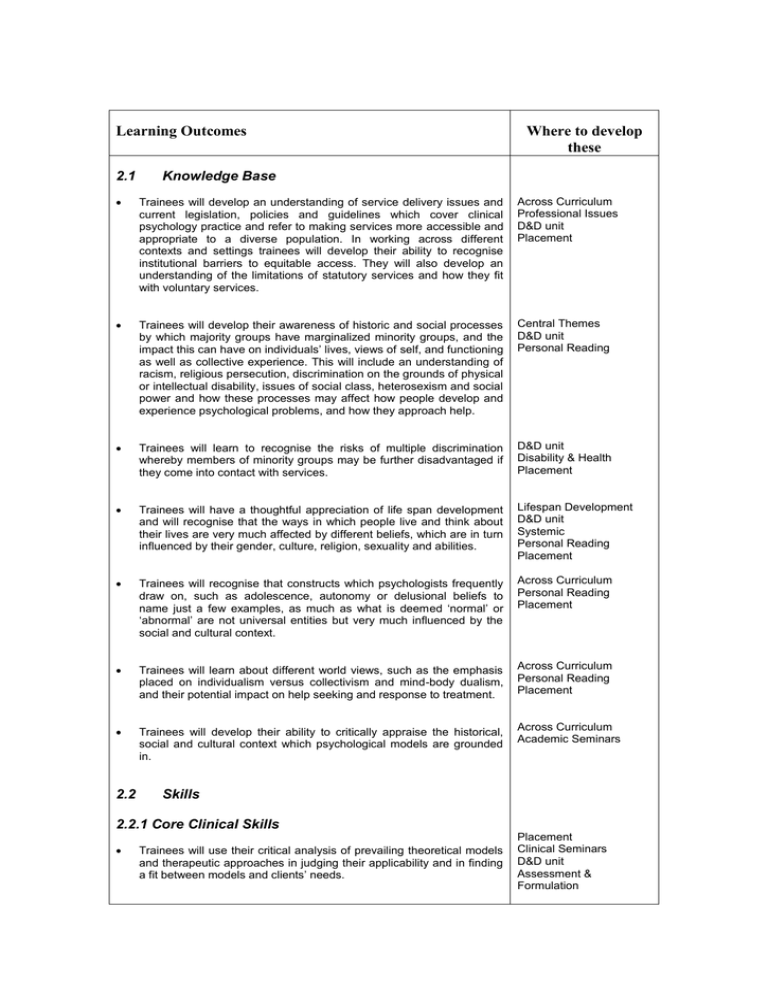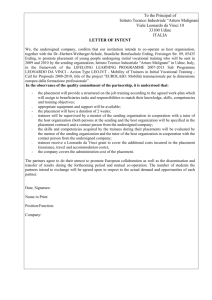Learning Outcomes Where to develop these 2.1
advertisement

Learning Outcomes 2.1 Where to develop these Knowledge Base Trainees will develop an understanding of service delivery issues and current legislation, policies and guidelines which cover clinical psychology practice and refer to making services more accessible and appropriate to a diverse population. In working across different contexts and settings trainees will develop their ability to recognise institutional barriers to equitable access. They will also develop an understanding of the limitations of statutory services and how they fit with voluntary services. Across Curriculum Professional Issues D&D unit Placement Trainees will develop their awareness of historic and social processes by which majority groups have marginalized minority groups, and the impact this can have on individuals’ lives, views of self, and functioning as well as collective experience. This will include an understanding of racism, religious persecution, discrimination on the grounds of physical or intellectual disability, issues of social class, heterosexism and social power and how these processes may affect how people develop and experience psychological problems, and how they approach help. Central Themes D&D unit Personal Reading Trainees will learn to recognise the risks of multiple discrimination whereby members of minority groups may be further disadvantaged if they come into contact with services. D&D unit Disability & Health Placement Trainees will have a thoughtful appreciation of life span development and will recognise that the ways in which people live and think about their lives are very much affected by different beliefs, which are in turn influenced by their gender, culture, religion, sexuality and abilities. Lifespan Development D&D unit Systemic Personal Reading Placement Trainees will recognise that constructs which psychologists frequently draw on, such as adolescence, autonomy or delusional beliefs to name just a few examples, as much as what is deemed ‘normal’ or ‘abnormal’ are not universal entities but very much influenced by the social and cultural context. Across Curriculum Personal Reading Placement Trainees will learn about different world views, such as the emphasis placed on individualism versus collectivism and mind-body dualism, and their potential impact on help seeking and response to treatment. Across Curriculum Personal Reading Placement Trainees will develop their ability to critically appraise the historical, social and cultural context which psychological models are grounded in. Across Curriculum Academic Seminars 2.2 Skills 2.2.1 Core Clinical Skills Trainees will use their critical analysis of prevailing theoretical models and therapeutic approaches in judging their applicability and in finding a fit between models and clients’ needs. Placement Clinical Seminars D&D unit Assessment & Formulation Learning Outcomes Where to develop these Core Clinical Skills continued Trainees will develop their skills in working with interpreters and will develop an understanding of potential difficulties and challenges when working in this way. Placement D&D unit Trainees will develop an ability to carefully reflect on their work and to question assumptions about similarity and difference and their potential or actual effects on clinical situations. Placement Clinical Seminars Core Clinical Skills D&D unit Systemic Trainees will increasingly be able to recognise their own values and assumptions about issues arising in their work, for example what is considered ‘normal’, ideas about parenting, gender relations, sexuality or age, and the impact these may have on their responses to clinical situations and their interactions with clients and others they come into contact with during their work. Trainees will develop their awareness of potential power differences between those they work with and themselves and how these may be influenced by, for example, social class, gender, ethnicity, religion, ability, age and professional status. They will develop skills in addressing power differences sensitively in their interactions with clients, carers and colleagues. 2.2.2 Placement Core Clinical Skills D&D unit Systemic Placement Core Clinical Skills D&D unit Systemic Assessment, Formulation & Intervention Trainees will develop their ability to respond sensitively and flexibly to the needs of clients and ask appropriate questions about clients’ backgrounds and their pertinence for the presenting difficulties and help seeking. Placement Assessment & Formulation Core Clinical Skills D&D unit Trainees will develop their understanding of the cultural specificity of psychometric and structured assessment tools. They will acquire an ability to plan and complete assessments which take clients’ backgrounds into account and which are mindful of the potential impact of clients’ minority status on their presentation and the results of any assessments. Placement Assessment & Formulation Clinical Seminars Personal Reading Trainees will develop their ability to reflect on their own beliefs and attitudes and their potential impact on engagement and the therapeutic process as well as their choice of assessment and intervention. Trainees will increasingly be able to demonstrate their awareness of issues of difference and diversity by incorporating these into their formulations and intervention planning. These skills should also be evident in trainees’ report writing, as should the ability to evaluate the impact of their own background on their clinical work. Placement Core Clinical Skills D&D unit Assessment & Formulation Systemic Clinical Seminars Placement Professional Issues Assessment & Formulation Case Report Writing 2
